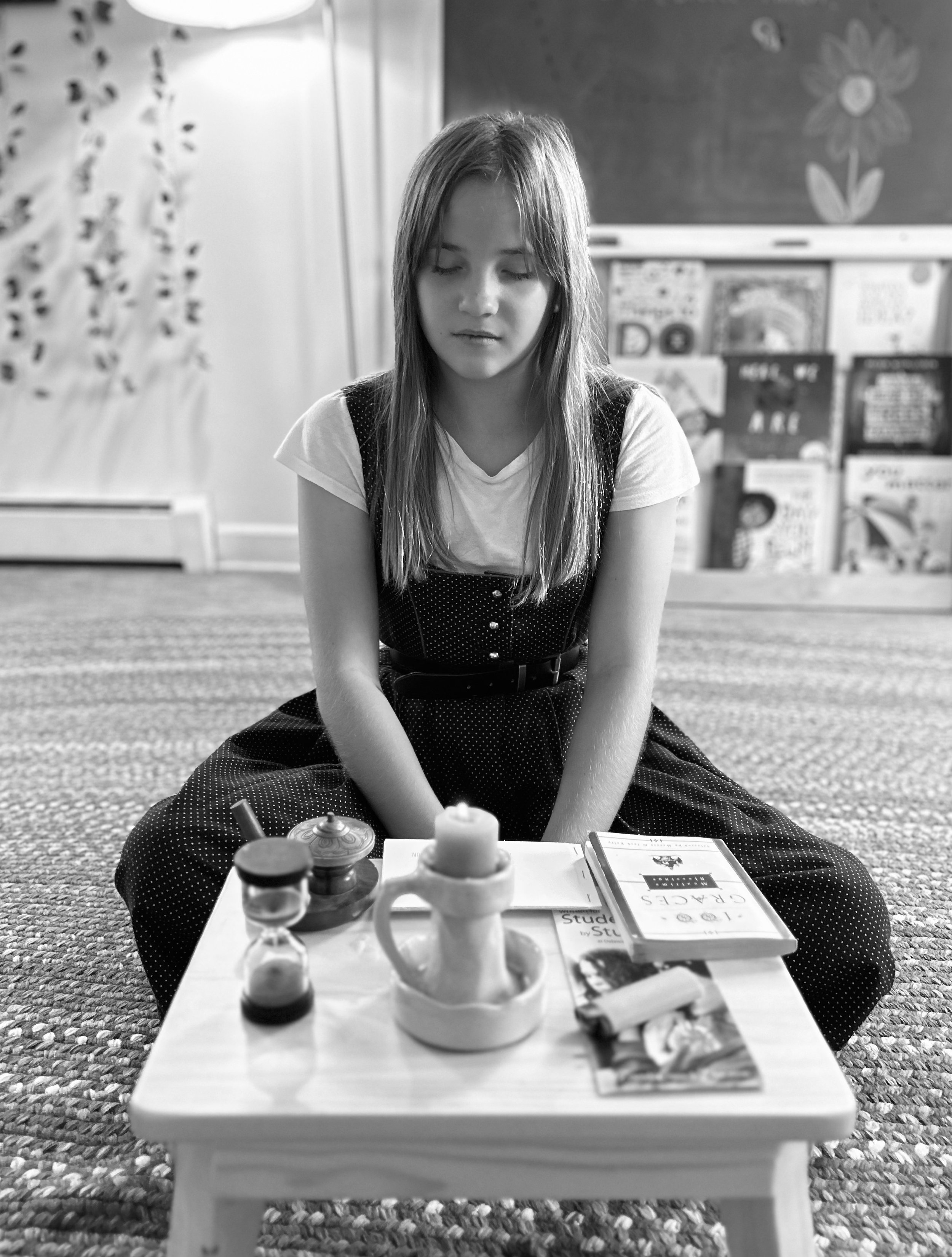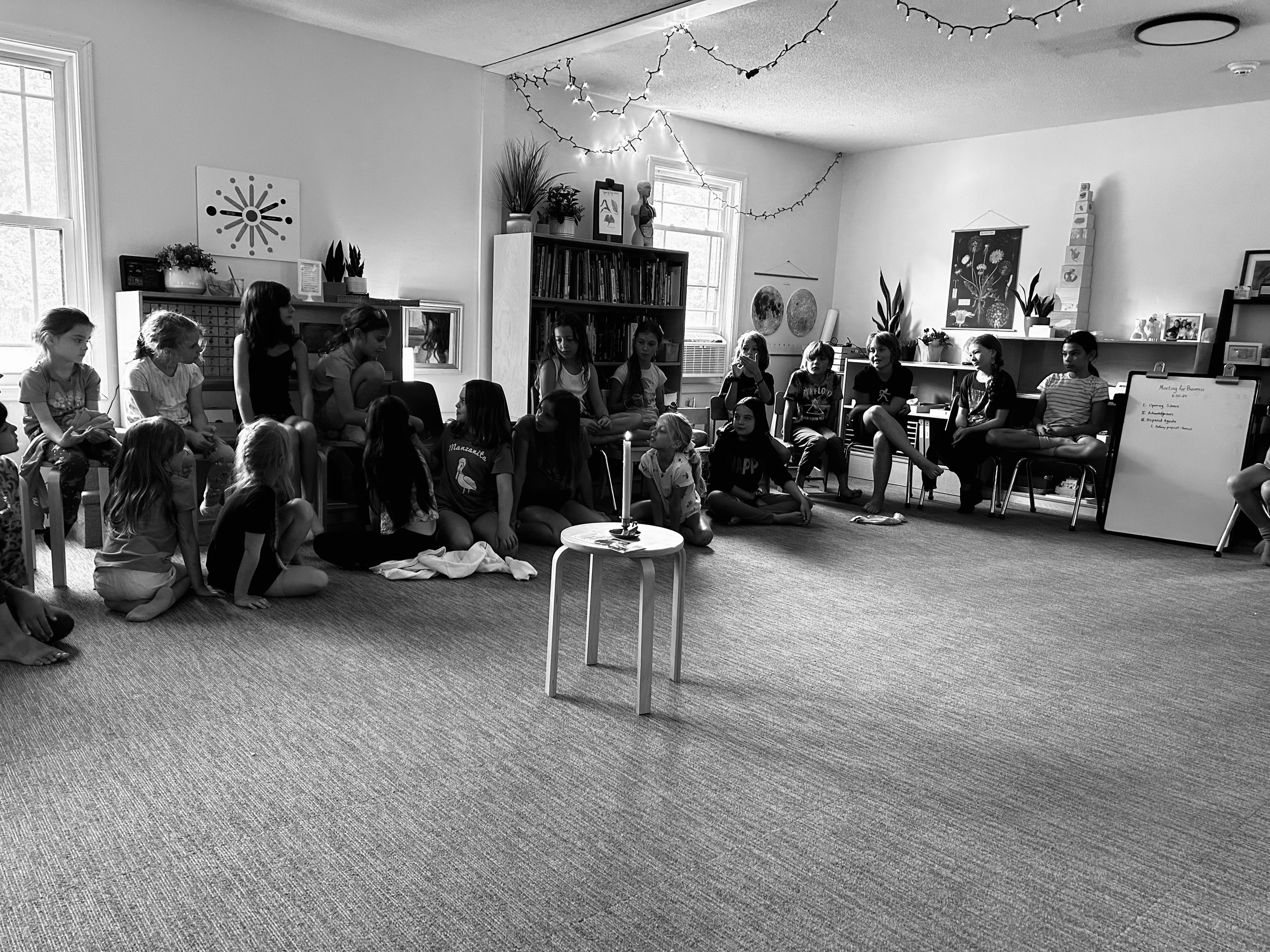
Let Your Life Speak
We believe that the purpose of education is not to impart knowledge but to help awaken and bring out the knowing & goodness that already exists within each of us. Through inquiry-based learning, we approach education as an opportunity for a “meeting for learning” in which each participant, child & adult alike, is responsible for what they bring to share. As we learn together, we are transformed; when guided & nurtured, a transformation can change the community, society, and world we live in for the better.
Friends education is based on the core Quaker belief of “letting our lives speak,” meaning our values & beliefs should be evident not just in words but in our actions. These actions are traditionally referred to as testimonies, and while terminology may vary according to different communities, they broadly include simplicity, integrity, equality, community, stewardship & peace.
Testimonies
-
Focusing on what is most important
Minimizing distractions
Acting humbly
Valuing the inward over the outward
Staying true to our purpose
-
Prioritize peace education
Center non-violence in our study & play
Practicing conflict resolution & restorative justice
Learning the difference between peacekeeping & peacemaking
-
Speaking honestly & acting truthfully
Being our authentic selves & learning who we are
Discerning our own truth & being open to new light
Living our lives as whole people
-
Supporting one another in our strengths & weaknesses
Better ourselves so that we may support each other
Creating inclusive environments
Putting other’s needs before our wants
Learning about our role in the greater community
-
Learning about social justice
Practicing anti-racism & becoming anti-racist
Learning about sex & gender equality
Distinguishing between equality & equity
Seeing “that of God” within everyone
-
Understanding our impact on our environment
Learning about the interconnection to all living things
Taking care of our possessions
Leaving space, the environment, and our earth better than we found it
Honoring the land we are occupying & acknowledging the original stewards of it
Meeting For Worship
Each week, the students and staff of Friends-Montessori School come together in silent reflection for our mid-week Meeting for Worship, a practice rooted in the Quaker tradition. This gathering is at the heart of our community, offering a shared space for stillness, connection, and spiritual growth.
As we settle in and "center down," each person engages with the silence in their own way. Some use this time for quiet contemplation or meditation, while others find spiritual nourishment, prayer, or simply a moment of peace in the midst of a busy week. There is no single way to experience the silence, but we believe that by sitting together in stillness, we deepen both our individual awareness and our collective sense of unity.
Though the meeting begins in silence, it is not about silence itself. Instead, the quiet serves as a space where wisdom, insight, and truth can emerge. Occasionally, a message may rise from within and be shared with the gathered group—whether a personal reflection, a newfound understanding, or a thought meant to inspire. These moments of spoken ministry help to strengthen our bonds as a community and encourage us to carry our reflections into daily life.
Meeting for Worship is an essential part of our school’s rhythm, grounding us in the values of mindfulness, openness, and shared experience. Through this practice, we cultivate a sense of presence, respect, and deep listening—skills that shape not only our time together but also the way we engage with the world.
Decision Making: Meeting For Business
At Friends-Montessori School, Meeting for Business is a time when students and staff come together to engage in the Quaker-based decision-making process. Rooted in Quaker values, this practice teaches collaboration, active listening, and shared responsibility. How we make decisions is a defining feature of a Friends education—one that emphasizes discernment, respect, and the belief that every voice holds a part of the truth.
Quakers believe that through corporate decision-making, a clearer, more thoughtful path forward can emerge. By listening deeply to one another and striving for unity, we work together harmoniously to make decisions that benefit our school community as a whole.
Meeting for Business takes place every week, alternating between whole-school and classroom-level meetings. Every participant, from our youngest students to our oldest, has an equal opportunity to speak and be heard. The meeting is guided by two co-clerks—one adult guide and one 6th-year student—who help facilitate discussion and discern the collective wisdom of the group.
Discussions during Meeting for Business are both practical and meaningful. Topics may range from refining recess procedures to developing sustainability initiatives, planning school events, or deciding how to allocate shared resources. Rather than voting, decisions are reached through the clerk’s discernment of the "sense of the meeting"—a moment when the group finds unity and ease in moving forward together.
To ensure continuity and accountability, detailed minutes of each meeting are recorded and shared for future reference. Through this process, students gain firsthand experience in thoughtful decision-making, community stewardship, and the power of respectful dialogue—skills that will serve them far beyond their time at Friends Montessori.
Queries
Queries are questions or a series of questions around a particular topic or theme used as a tool for individual discernment or group reflection. Queries challenge us personally & spiritually by asking us to hold our beliefs & actions up to the light and see that we are living with integrity. They offer a mirror into the spirit & allow us to see where we are on our own & collective path of growth, development, & betterment. We begin each day by reading a query followed by a few minutes of silence.
-
Do I speak to myself with kind and gentle words, not using negative self-talk? Do I set realistic goals for myself? Am I working to be a little better each day? Do I remind myself that mistakes are part of learning and that I will make plenty? Do I remind myself that I am not and will never be perfect, but I will try to be my best self? Do I find time for quiet reflection?
-
Do I ask for help when I need it? Do I remember to use the “3 Before Me” advice before requesting an adult? Do I look for different ways to solve problems without giving up? Do I challenge myself? Do I look for ways to help others the best I can? Am I aware that at any time, I might have the answer someone is looking for?
-
Do I take care of my body by ensuring I am eating lunch and drinking plenty of water throughout the day? Do I come to school well-rested by making sure I am getting enough sleep each night? Do I wear clothing that protects me from the weather? Do I wear clothing that does not distract me or my classmates or draw attention away from our work?
-
Do I prepare myself to attend school each day, focused and ready to work and learn? Do I choose work from various subjects and topics throughout the week? Do I choose work that challenges me? Can I use my work plan to help manage my work time? Do I prioritize works that have due dates? Do I keep up with required work or follow-up so that I have time to pursue my learning interests?
-
Am I truthful with my words? Am I honest with my actions? Do I try to do what I know is right even when no one else is looking? Do I speak my truth and stand up for what I know is right? Do I work to be my best self even when others pressure me to do something else? Do I listen to my conscience or inner guide?
-
Do I recognize my part in the school community? Am I willing to consider the needs of others before my wants? Do I try to give more than I take? Do I treat others the way I would like to be treated? Do I take responsibility for my actions? Am I accountable for my mistakes?
-
Do I speak up in whatever way I can against injustice? Am I willing to take a stand for others who are being mistreated? Do I interrupt and call in others if I hear language rooted in violence or oppression? Do I respond with action when I encounter systems of oppression? Do I read with critical eyes and listen with a critical ear?
-
Do I work to build friendships based on shared interests and having fun? Do I stay open to the possibility of making new friends? Do I look for friendships with a variety of people? Do I remind myself that friendship takes work and everyone makes mistakes or has bad days? Do I actively listen when my friend is talking? Do I compromise with my friends when we disagree? Do I do my best to avoid any friendship “trouble starters?”



Inquiry-based Learning: What Is It?
Inquiry-based learning is a student-centered educational approach that aligns with the Quaker values of simplicity, peace, integrity, community, and equality. This method emphasizes curiosity, critical thinking, and active engagement in the learning process. Here’s how it is typically practiced:
-
Students are encouraged to ask questions and pursue topics that interest them. This fosters a sense of ownership over their learning and nurtures their natural curiosity.
-
Learning is often a collaborative effort, with students working together to explore questions and solve problems. This teamwork reflects the Quaker commitment to community and mutual respect.
-
Reflective practices are integrated into the learning process, encouraging students to think deeply about their experiences and the material they are studying. This mirrors the Quaker tradition of reflection and inner listening.
-
Subjects are often taught in an interdisciplinary manner, helping students make connections between different areas of knowledge and see the broader relevance of their studies. This approach supports a holistic understanding of the world.
-
Students are actively engaged in their learning through hands-on activities, projects, and real-world problem-solving. This engagement aligns with the Quaker value of integrity, as students learn by doing and experiencing directly.
-
Teachers act as facilitators or guides rather than traditional instructors. They support students in their inquiry, provide resources, and help them develop the skills needed to conduct effective research and analysis.
-
Inquiry often extends beyond the classroom, involving the local community and addressing real-world issues. This practice helps students understand their role in the community and the importance of social responsibility.
-
Many inquiries are centered around themes of peace, social justice, and ethical decision-making, reflecting Quaker concerns for equality and activism. Students are encouraged to think about how their learning can contribute to a more just and peaceful world.
Through inquiry-based learning, Friends schools cultivate a learning environment where students not only gain knowledge but also develop as thoughtful, reflective, and engaged members of their communities. This approach nurtures lifelong learners equipped to think critically, act ethically, and contribute positively to society.



